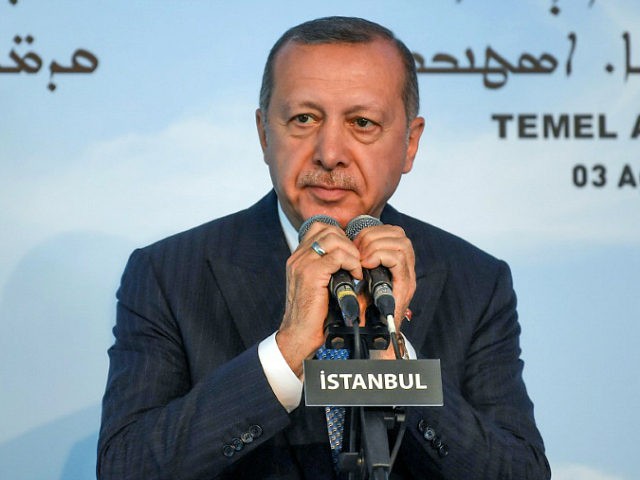Turkey has renewed plans to launch a military operation against the U.S.-allied Kurdish fighters who helped the United States defeat the Islamic State’s (ISIS/ISIL) territorial caliphate, the Turkish president announced over the weekend.
The announcement came as news reports surfaced that Turkish President Recep Tayyip Erdogan is supplying weapons to al-Qaeda-linked jihadis working with Ankara-allied rebels to prevent an onslaught by forces loyal to dictator Bashar al-Assad, backed by Russian airstrikes, to clear the last remaining opposition stronghold in Syria. Al-Qaeda-linked jihadis and, to a lesser extent, Turkey-allied fighters control the territory in and around Syria’s Idlib province, considered the last remaining rebel stronghold in Syria.
The Assad regime has struggled to clear the area of the jihadis, a move that would allow the regime to consolidate its control of most of Syria, with the exception of land in northern Syria controlled by U.S.-backed People’s Protection Units (YPG/YPJ). YPG fighters are the armed wing of the Democratic Union Party (YPD) that control most of northern Syria.
On Sunday, Erdogan noted that it has shared Turkey’s plan to carry out an offensive against Kurds in northern Syria with Russia and the United States.
“We entered Afrin, Jarabulus, and Al-Bab [in northern Syria], and now we’re going to enter east of the Euphrates,” home to the territory controlled by YPG, Turkish President Recep Tayyip Erdoğan declared on Sunday, Hurriyet Daily News reported on Monday.
Erdogan was referring to successful operations against the Syrian Kurds and, to a lesser extent, ISIS since 2016 under Operations Euphrates Shield and Olive Branch.
Ankara has long considered the YPG to be an extension of the Kurdistan Worker’s Party (PKK), a United States- and Turkey-designated terrorist group that has been waging a decades-long insurgency on Turkish soil.
The political wing of the U.S.-backed Syrian Democratic Forces (SDF), a Kurdish-Arab alliance primarily comprised of and led by the YPG, denies any links to the PKK.
For months, Turkey has cautioned about a looming campaign against Kurds in northern Syria, citing the ongoing presence of YPG fighters and PKK terrorists in the region straddling the Turkish border and the threat they pose. Turkey has repeatedly failed to convince the United States to end its relationship with the YPG. Some U.S. officials have acknowledged a link between the YPG/PYD and PKK militants who have also fought against ISIS.
Despite the concerns, the United States continues to support the Kurdish fighters as the most effective force against ISIS.
It appears the Kurds have played a bigger role in fully depriving ISIS of its territory than Turkey. The Turks have been primarily focused on preventing the Syrian Kurds from consolidating power in their region, which borders areas in Turkey populated by Kurds. Meanwhile, the SDF has played a pivotal role in pulverizing ISIS’s territorial caliphate.
In January 2018, U.S. President Donald Trump warned Turkey not to carry out operations against the American-allied YPG. For several months, Turkey has threatened to attack the Syrian Kurds, arguing they are gaining too much clout near the Turkish border where they can provide support to the PKK waging an insurgency against Turkey.
Turkey’s renewed threat against the Syrian Kurds came as Ankara still struggling to disarm and push out al-Qaeda-linked jihadis who have gained ground in and around northeastern Syria’s Idlib province under a buffer zone agreement with pro-Assad Russia.
The al-Qaeda-linked jihadis are the last group with control of substantial territory in Syria that experts from the American Enterprise Institute (AEI) believe can be used to establish an Islamic emirate. Al-Qaeda-linked jihadis and Turkish-backed rebels control most of the area in an around Idlib.
Some reports suggest Turkey, which was supposed to be responsible for pushing the jihadis out of the region under an agreement with post-Assad Russia, is arming al-Qaeda terrorists against the Syrian dictator.
In May, Reuters reported:
A Western intelligence source said Washington had given a “greenlight” for the Turkey-backed mainstream rebels to use the TOW missiles, which had been in storage in the latest campaign.
Washington, which has criticized Russia’s latest campaign and urged a ceasefire, also said it saw signs that Assad has used poison gas in the latest offensive and warned that it would respond “quickly and appropriately” if this were proven.
Citing activists in March of 2018, the Catholic News Service (CNS) reported that, after taking over the Syrian Kurdish town of Afrin, Turkey used “hardline jihadist proxies, including Islamic State and al-Qaeda militants, to eliminate the presence of Kurds and other ethnic and religious minorities along its border,” including Christians and Yazidis.
The U.S. military appeared to turn a blind eye to Turkey seizing Afrin from the Syrian Kurds, who helped them fight ISIS, favoring their relationship with NATO ally Ankara over the Kurds.
After waiting for the Russia-Turkey buffer zone agreement to bear fruit and rid the Idlib region of al-Qaeda-linked jihadis and other terrorists, the U.S. has begun to target militants in the area. Reportedly, a ceasefire recently agreed to by the warring parties is largely holding following an aerial onslaught by forces loyal to Assad and support from Russian airstrikes. Moreover, recent news reports reveal that Russian special forces are targeting al-Qaeda-linked jihadis behind enemy lines.
Russia and Turkey blame one another for the failure in Idlib. In July, Asharq Al-Awsat reported:
Recent negotiations between Washington and Moscow have produced “silent agreements,” allowing the US army to launch strikes against al-Qaeda-affiliates in northwestern Syria and Russia to take “calm steps” to contain Iran’s presence in the country.
Pro-Iranian forces have been largely absent from the fight against al-Qaeda in Syria. The Pentagon has accused Iran of backing al-Qaeda.

COMMENTS
Please let us know if you're having issues with commenting.